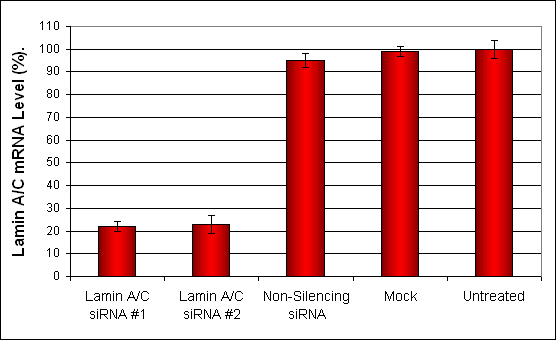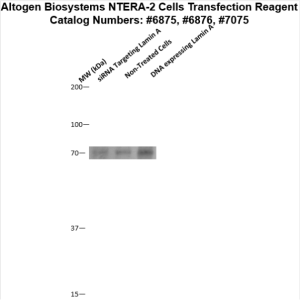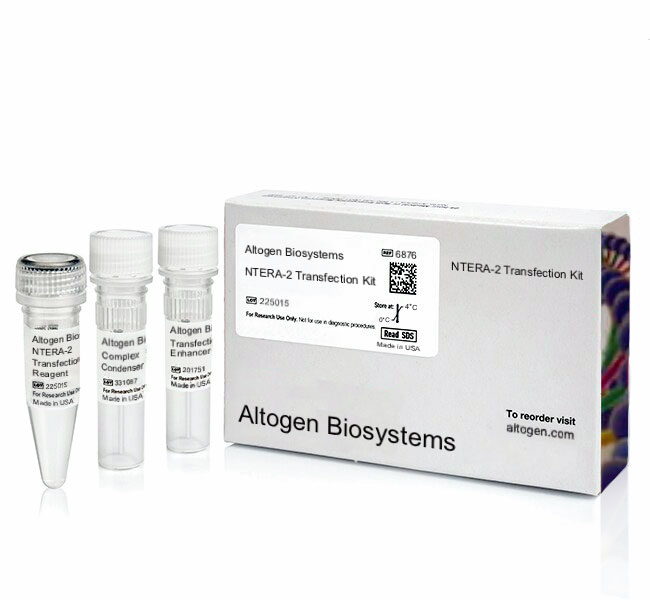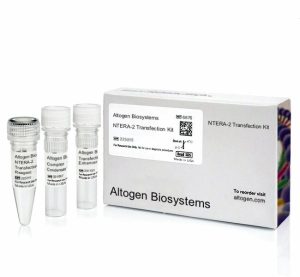Description
Purchase Orders: Click “Add to Cart” button to order, then email PO to orders@altogen.com.
Product Availability: In Stock.
Transfection Reagent for NTERA-2 Cells (Embryonal Carcinoma Cells, CRL-1973)
-
Two component formulation enhances lipid mediated transfection efficiency
-
Optimized easy-to-use transfection protocol provided for transfection of siRNA, DNA, mRNA, and microRNA
-
Kit includes Transfection Enhancer reagent and recommended transfection protocol
-
Reproducible transfection results
- Download in vitro NTERA2 transfection protocol: [PDF]
- Download NTERA2 CRISPR/Cas9 transfection protocol: [PDF]
-
Download PowerPoint presentation for NTERA2 cells transfection kit: [PPT]
-
Developed and manufactured by Altogen Biosystems
Reagent exhibits at least 76% transfection efficiency of siRNA delivery. Transfection efficiency was determined by RT-PCR.
Product Description:
Optimized transfection reagent for NTERA2 cells high transfection efficiency and low cytotoxicity.
Transfection Protocol and SDS:
Download Altogen Biosystems NTERA2 Transfection Protocol: [PDF]
Download SDS: [PDF]
NTERA-2 Cell Line:
NTera2 (also known as NCCIT) is a human testicular embryonic carcinoma cell line that was originally derived from a patient with a malignant testicular germ cell tumor. This cell line is commonly used in cancer research as a model for studying germ cell tumors and testicular cancer biology, drug discovery, and development of new therapies. NTera2 cells are characterized by their ability to differentiate into multiple cell lineages, including neurons and glial cells, in response to retinoic acid treatment. These cells also express markers of pluripotency, such as OCT4 and NANOG, and have a near-diploid karyotype. Researchers have used NTera2 cells to study various aspects of testicular cancer biology, including the mechanisms of tumor initiation and progression, the signaling pathways involved in germ cell differentiation and self-renewal, and the development of new therapeutic agents for germ cell tumors. This cell line has also been used as a model for studying stem cell biology and for testing the safety and efficacy of drugs targeting pluripotent stem cells. Additionally, NTera2 cells have been used in neuroscience research to study neural differentiation and to investigate the molecular mechanisms underlying neurodegenerative diseases.
Embryonal carcinomas have proven to be invaluable models for studying the mechanisms that control differentiation of cells during embryogenesis in vitro. The NTERA-2 cell line is considered a well-characterized system of ectodermal differentiation. NTERA-2 cells can be used to study the early stages of human neurogenesis as they display developmental and biochemical properties similar to embryonic cells. The NTERA-2 cl.D1 cell line was established from the parental NTERA-2 cell line after a xenograft of a 22-year-old Caucasian male with malignant pluripotent embryonic carcinoma of the testis. This cell line has unique properties, making it useful for studying of certain types of testicular cancer. These cells exhibit high activity expression of N-myc oncogene. The cell line contains untreated cells with resistance to HCMV, and HIV-1. NTERA-2 cl.D1 exhibits an epithelial-like morphology, though there is more variety than in other cell lines due to the high differentiation of these cells. Altogen Biosystems manufactures lipid-based transfection kit optimized for NTERA-2 cells that can be utilized for both transient transfection and development of stable NTERA-2 cell lines and commonly used for life sciences laboratory research studies.
Cell line mutations:
| DEGS2 | 123099 | 37 | 14 | 100615443 | 100615443 | Silent | SNP | G | A |
| NLRP8 | 126205 | 37 | 19 | 56490859 | 56490859 | Silent | SNP | G | A |
| GPC1 | 2817 | 37 | 2 | 241398519 | 241398519 | Missense_Mutation | SNP | G | A |
| TECPR1 | 25851 | 37 | 7 | 97857345 | 97857345 | Missense_Mutation | SNP | C | T |
| GPR153 | 387509 | 37 | 1 | 6314173 | 6314173 | Missense_Mutation | SNP | C | T |
| NBPF1 | 55672 | 37 | 1 | 16913645 | 16913645 | Silent | SNP | G | A |
| ZSCAN20 | 7579 | 37 | 1 | 33960037 | 33960037 | Missense_Mutation | SNP | T | C |
| ZMYM4 | 9202 | 37 | 1 | 35864555 | 35864555 | Missense_Mutation | SNP | A | T |
Data:

Figure 1. siRNAs targeting Lamin A/C mRNA or non-silencing control siRNA were transfected into NTERA-2 cells following the recommended protocol. At 48 hours post-transfection the cells were analyzed by RT-PCR for Lamin A/C gene expression levels. 18S rRNA levels were used to normalize the Lamin A/C data. Values are normalized to untreated sample. Data are means ± SD (n=4).

Figure 2. Protein expression of Lamin A in NTERA-2 cells. DNA plasmid expressing Lamin A or siRNA targeting Lamin A were transfected into NTERA-2 cells following Altogen Biosystems transfection protocol. At 72 hours post-transfection the cells were analyzed by Western Blot for protein expression levels (normalized by total protein, 10 µg of total protein loaded per each well). Untreated cells used as a negative control.
Altogen Biosystems is a life sciences company that offers cell type-specific and optimized transfection products, electroporation kits, and in vivo delivery reagents. Advanced formulation of reagents and optimized transfection protocols provide efficient cellular delivery of protein, DNA, mRNA, shRNA and siRNA molecules. Read more about transfection technology at Altogen’s Transfection Resource. Altogen Labs provides contract research studies for preclinical research, IND applications, and drug development, for more details please visit AltogenLabs.com
Volume Options:
- 0.5 ml (Catalog #6875)
- 1.5 ml (Catalog #6876)
- 1.5 ml CRISPR (Catalog #2186)
- 8.0 ml (Catalog #7075)
Purchase Orders: Click “Add to Cart” button to order, then email PO to orders@altogen.com.
Product Availability: In Stock.






